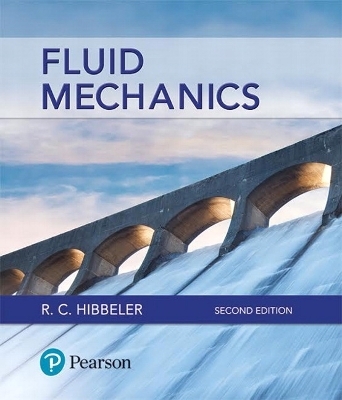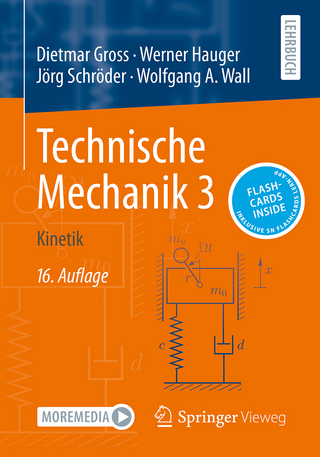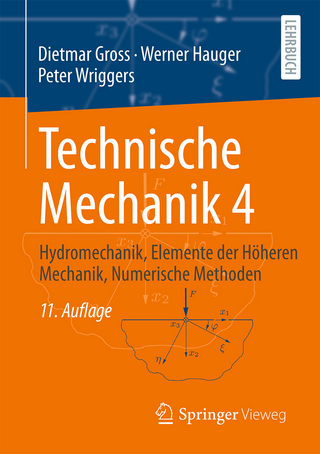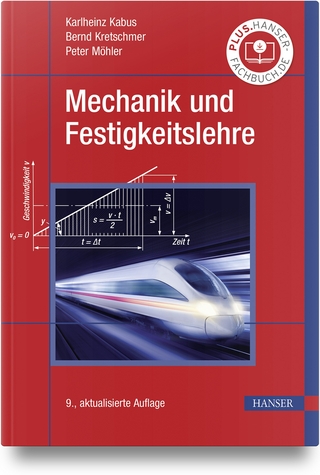
Fluid Mechanics
Addison Wesley (Verlag)
978-0-13-464929-0 (ISBN)
- Titel erscheint in neuer Auflage
- Artikel merken
The 2nd Edition addresses comments and suggestions from colleagues, reviewers in the teaching profession, and many of the author's students, including expanded topic coverage and new Example and Fundamental Problems intended to further your understanding of the theory and its applications.
If you are not using Mastering Engineering, you can purchase access to the videos that accompany this title here.
R.C. Hibbeler graduated from the University of Illinois at Urbana-Champaign with a BS in Civil Engineering (majoring in Structures) and an MS in Nuclear Engineering. He obtained his PhD in Theoretical and Applied Mechanics from Northwestern University. Professor Hibbeler’s professional experience includes postdoctoral work in reactor safety and analysis at Argonne National Laboratory, and structural and stress analysis work at Chicago Bridge and Iron, as well as at Sargent and Lundy in Chicago. He has practiced engineering in Ohio, New York, and Louisiana. Professor Hibbeler currently teaches both civil and mechanical engineering courses at the University of Louisiana– Lafayette. In the past, he has taught at the University of Illinois at Urbana-Champaign , Youngstown State University, Illinois Institute of Technology, and Union College.
Table of Contents
Fundamental Concepts
1-1. Introduction
1-2. Characteristics of Matter
1-3. Systems of Units
1-4. Calculations
1-5. Problem Solving
1-6. Basic Fluid Properties
1-7. Viscosity
1-8 Viscosity Measurement
1-9. Vapor Pressure
1-10. Surface Tension and Capillarity
Fluid Statics
2-1. Pressure
2-2. Absolute and Gage Pressure
2-3. Static Pressure Variation
2-4. Pressure Variation for Incompressible
2-5. Pressure Variation for Compressible Fluids
2-6. Measurement of Static Pressure
2-7. Hydrostatic Forces on Plane Surfaces
2-8. Hydrostatic Forces on an Incline Plane or Curved Surface Determined by Projection
2-9. Buoyancy
2-10. Stability
2-11. Constant Accelerated Translation of a Liquid
2-12. Steady Rotation of a Liquid.
Kinematics of Fluid Motion
3-1. Types of Flow Description
3-2. Types of Fluid Flow
3-3. Graphical Descriptions of Fluid Flow
3-4. Fluid Acceleration
3-5 Streamline Coordinates
3-6. The Reynolds Transport Theorem
Conservation of Mass
4-1. Rate of Flow and Average Velocity
4-2. Continuity Equation
Energy of Moving Fluids
5-1. Euler’s Equations of Motion
5-2. The Bernoulli Equation
5-3. Applications of Bernoulli’s Equation
5-4.Energy and the Hydraulic Gradient.
5-5. The Energy Equation
Fluid Momentum
6-1. The Linear Momentum Equation
6-2. The Angular Momentum Equation
6-3. Propellers
6-4. Applications for Control Volumes Having Rectilinear Accelerated Motion
6-5. Turbojets
6-6. Rockets
Differential Fluid Flow
7-1. Differential Analysis
7-2. Kinematics of Differential Fluid Elements
7-3. Circulation and Vorticity
7-4. Conservation of Mass
7-5. Equations of Motion of a Fluid Particle
7-6. The Euler and Bernoulli Equations
7-7. The Stream Function
7-8. The Potential Function
7-9. Basic Two-Dimensional Flows
7-10. Superposition of Flows
7-11. The Navier-Stokes Equations
7-12. Computational Fluid Dyanmics
Dimensional Analysis and Similitude
8-1. Dimensional Analysis
8-2. Important Dimensionless Numbers
8-3. The Buckingham Pi Theorem
8-4. Similitude
Viscous Flow Within Enclosed Surfaces
9-1. Steady Laminar Flow between Parallel Plates
9-2. Navier-Stokes Solution for Steady Laminar Flow Between Parallel Plates
9-3. Steady Laminar Flow Within A Smooth Pipe
9-3. Laminar and Turbulent Shear Stress Within a Smooth Pipe
9-4. Navier-Stokes Solution for Steady Laminar Flow Within a Smooth Pipe
9-5. The Reynolds Number
9-6. Laminar and Turbulent Shear Stress Within a Smooth Pipe
9-7. Fully Developed Flow From an Entrance
9-8. Turbulent Flow Within a Smooth Pipe
Analysis and Design for Pipe Flow
10-1. Resistance to Flow in Rough Pipes
10-2. Losses Occurring From Pipe Fittings And Transitions
10-3. Single Pipeline Flow
10-4. Pipe Systems
10-5. Flow Measurement
Viscous Flow Over External Surfaces
11-1 The Concept of the Boundary Layer
11-2. Laminar Boundary Layers
11-3 The Momentum Integral Equation
11-4 Turbulent Boundary Layers
11-5. Laminar and Turbulent Boundary Layers
11-6. Drag and Lift
11-7. Pressure Gradient Effects
11-8. The Drag Coefficient
11-9. Methods for Reducing Drag
11-10. Lift and Drag on an Airfoil
Turbomachinery
12-1. Types of Turbomachines
12-2. Axial-Flow Pumps
12-3. Ideal Performance for Axial-Flow Pumps
12-4. Radial-Flow Pumps
12-5. Turbines
12-6. Pump Performance
12-7. Cavitation and Net Positive Suction Head
12-8. Pump Selection Related to the Flow System
12-9.Turbomachine Similitude
Open Channel Flow
13-1. Types of Flow in Open Channels
13-2. Wave Celerity
13-3. Specific Energy
13-4. Open Channel Flow Over a Rise
13-5. Open Channel Flow Through a Sluice Gate
13-6. Steady Uniform Channel Flow
13-7. Gradual Flow With Varying Depth
13-8. The Hydraulic Jump
13-9. Weirs
Compressible Flow
14-1. Thermodynamic Concepts
14-2. Wave Propagation Through a Compressible Fluid
14-3. Types of Compressible Flow
14-4. Isentropic Stagnation Properties
14-5. Isentropic Flow Through a Variable Area
14-6. Isentropic Flow Through Converging and Diverging Nozzles
14-7. Normal Shock Waves
14-8. Shock Waves in Nozzles
14-9. Oblique Shocks
14-10. Compression and Expansion Waves
14-11. Compressible Flow Measurement
| Erscheinungsdatum | 11.03.2017 |
|---|---|
| Verlagsort | Boston |
| Sprache | englisch |
| Maße | 201 x 236 mm |
| Gewicht | 1624 g |
| Themenwelt | Naturwissenschaften ► Physik / Astronomie ► Mechanik |
| Technik ► Maschinenbau | |
| ISBN-10 | 0-13-464929-X / 013464929X |
| ISBN-13 | 978-0-13-464929-0 / 9780134649290 |
| Zustand | Neuware |
| Informationen gemäß Produktsicherheitsverordnung (GPSR) | |
| Haben Sie eine Frage zum Produkt? |
aus dem Bereich


